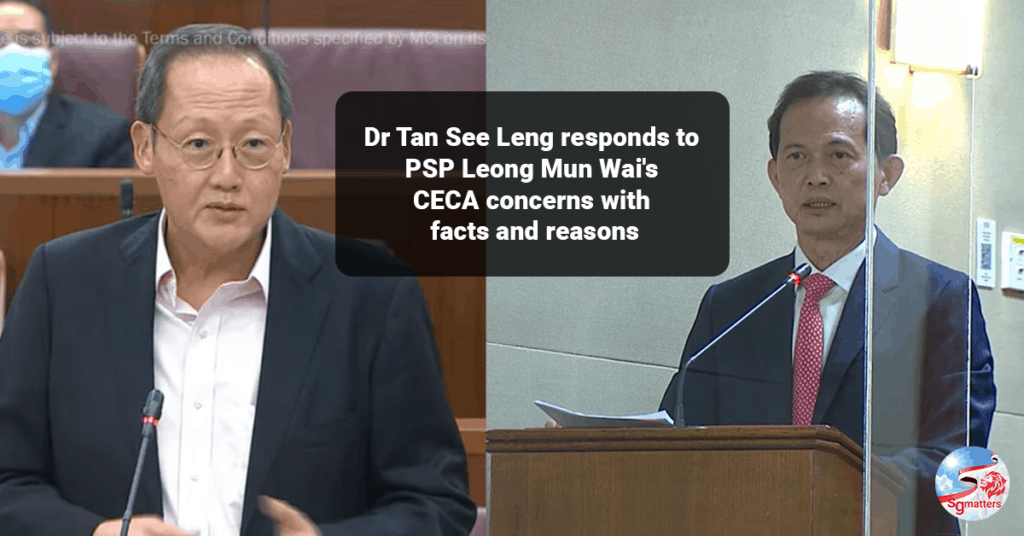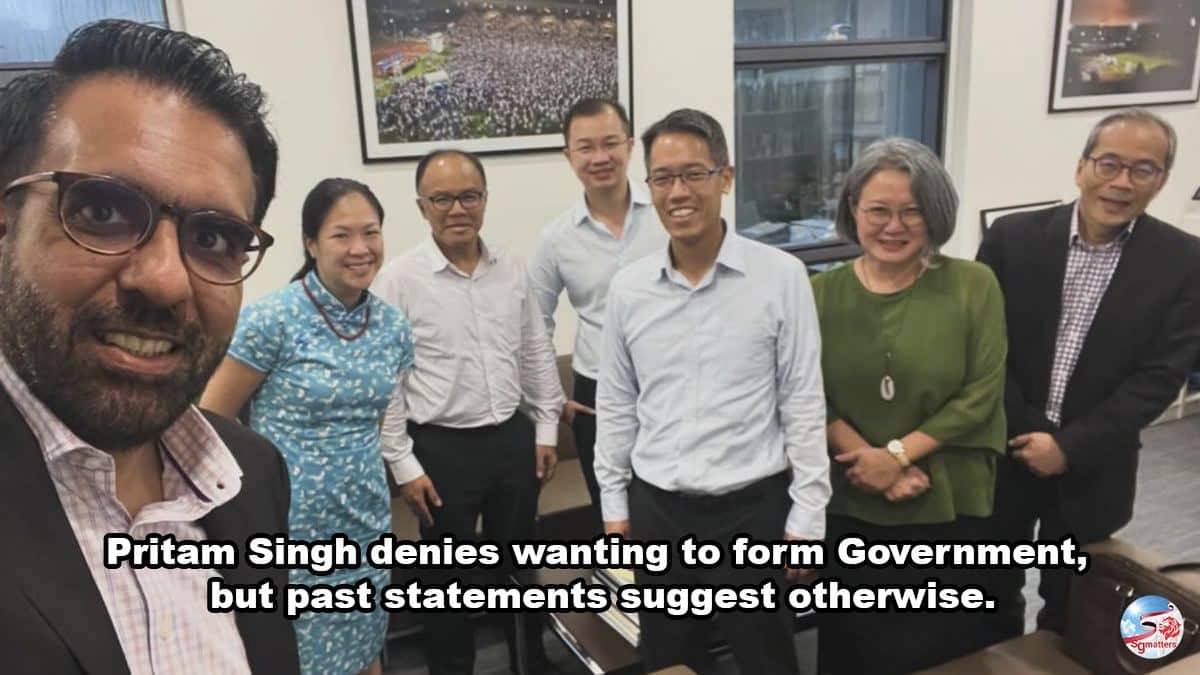Addressing the unhappiness surrounding the CECA, Dr Tan See Leng said the heart of the matter is how, we as a small country devoid of any natural resources remain open to global talent to create opportunities for Singaporeans, while managing the attendant social repercussions.
Singapore has a good Singaporean talent pool, but our pool is just not large enough to meet the breadth and the depth of all the needs of enterprises, Manpower Minister Dr Tan See Leng said in his ministerial statement delivered in Parliament, 6 July 2021. We need foreigners and often, foreigners bring in skills which complement the Singaporeans’ skill.
Addressing a fundamental misconception, Dr Tan explained:
When a company comes in to invest, and say it needs 3,000 people, it may find about 2,500 of these talents in Singapore, but it will need to supplement this 2,500 and bring in 500 from overseas. If we objected and insisted on the balance 500 to all come from Singapore regardless, we cannot expect the investment to come in, and these 2,500 jobs for locals would be greatly compromised.
Today, there are still 22,000 PMEs jobs that are not filled and companies are desperate to fill these jobs.

Will doing away with foreigners reduce displacement of older PMEs?
On Mr Leong Mun Wai’s suggestion that doing away with foreigners will reduce the displacement of our older PMEs, Dr Tan explained that the private sector and real economy do not operate this way.
There will always be some displacement of PMEs, whether older or younger, in any economy because the business world is not static. For example, when industries change, when companies relocate, or when companies downsize, PMEs will be displaced, whether they’re young or old. Not having foreigners here does not change the fact that such events will result in displacement of PMEs.

“If we tell companies which want to invest in Singapore that they can only employ Singaporeans, or first employ Singaporeans who have been displaced, regardless of skills, the answer will be simple: they just will not come to Singapore.”
Companies that come here will hire Singaporeans, but they also need the flexibility to hire the best available talent, from around the world to complement the Singaporeans, Dr Tan said.
“The fundamental question is how to strike a balance between ensuring that businesses have access to skills and manpower to grow and succeed, while creating opportunities for local workers to grow and progress.”
Foreign manpower to complement, not displace local workforce
Foreign manpower are here to complement and not displace the local workforce. They should not come to Singapore just because they are cheaper to hire. Instead, they should bring in extra skills to help the companies, and create more Singaporean jobs.
Hence the government set quotas and levies for all Work Permit and S Pass level to regulate foreign worker numbers. These have been progressively tightened to reduce manpower reliance, spur job re-design and quality growth.
Why no quota or levy for EPs
This is because there is fierce competition for global talent and worldwide shortages in areas such as technology and digital skills.
Imposing a quota would limit our ability to compete at the high-end of the global economy, while for a levy to have any effect on EP numbers, it would have to be set very high. That would substantially increase business costs.
The government has therefore focused on raising the quality bar for EP holders through requirements on salary and qualifications to make sure that the EPs who come in are at the right level and bring the right skills, necessary expertise, and experience to contribute significantly to our economy.
What about dependents?
Since May this year, DP holders who wish to work in Singapore can no longer obtain an LOC (Letter of Consent). Instead, they will have to qualify for a relevant work pass on their own merit, and go through normal work pass routes.
Previously, the number of Dependant’s Pass (DP) holders who have sought employment in Singapore via a Letter of Consent (LOC) constitute only about 1% of all Work Pass holders.
There are limits to how far we can tighten our controls, without eventually hurting Singaporeans.

There will always be calls from workers to tighten our foreign workforce policies further, just as there will always be calls from businesses to relax them, Dr Tan said.
“It is the constant tightrope that MOM and MTI have to navigate delicately amidst highly competitive global markets for both investments and talent. There are limits to how far we can tighten our controls, without eventually hurting Singaporeans.
“With remote working becoming more prevalent, companies increasingly do not need to site their manpower in Singapore. In fact, we may find more businesses simply choosing to move entire business functions offshore, if it becomes too difficult, onerous or expensive to operate here. Singaporeans will end up losing their jobs too.”
Helping Singaporeans win through a system of education and training
“Singaporeans are displaced from their jobs not only because of competition from foreign workers, but because of other factors like technological change and industries phasing out.
“This is why the government invests so heavily in retraining and skills development, so that displaced workers can gain new skills and reinvent themselves, either by doing a different job in
the same industry, or transiting to another industry altogether.”
During this pandemic, the Government has stepped up support for Singaporeans through:
SGUnited Jobs and Skills Package (SGUJS)
To help Singaporeans to acquire job-related skills and capabilities, and access expanded employment opportunities.
As of end-April 2021, more than 110,000 locals have been placed into jobs and skills opportunities as a result of the SGUJS Package.
Jobs Growth Incentive (JGI)
To support employers to expand local hiring from September 2020 to September 2021 (inclusive), so as to create good and long-term jobs for locals.
Within the first three months of implementation, the JGI supported 27,000 employers who hired 130,000 new locals.
SGUnited Jobs and Skills Centres
Set up in all 24 HDB towns to make career matching services more accessible.
The Retrenchment Taskforce, led by WSG and supported by NTUC’s Employment and Employability Institute, reached out to nearly all retrenched local workers in 2020. Of those who took up the Taskforce’s employment facilitation assistance, two-thirds of them have found jobs within 6 months.
The numbers speak for themselves.
The total number of EPs has increased by around 112,000 for the period from 2005 to 2020. Over this period, the number of local PMEs increased significantly by more than 380,000. This is more than 3 times the increase in the number of EPs.
In 2020, total employment (excluding migrant domestic workers) shrank by 166,600. Foreign employment took the hit in this pandemic, shrinking by 181,500. Resident employment, in the other hand, expanded by 14,900 despite the downturn.
“Given our shortage of manpower, even if the workers don’t come from India, they will come from somewhere else. I assume and hope that Mr Leong is not objecting to Indians per se. The point is: are they helping us grow the economy, and create Singaporean jobs? The answer is yes.”
[irp posts=”9174″ name=”2 common myths about CECA that causes a big hoo-ha”]





